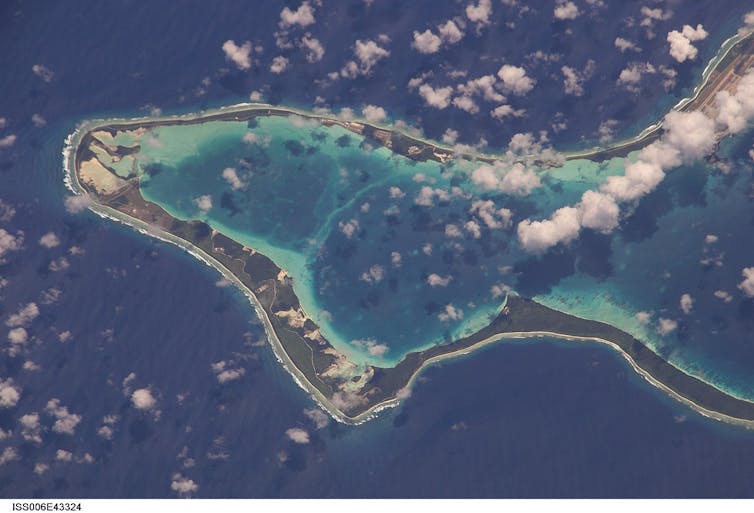This post was originally published on The Conversation
The decades-long Chagos islands dispute has finally entered a new chapter. The UK officially agreed to return the sovereignty of the archipelago to Mauritius.
The Indian Ocean islands are strategically situated near key shipping lanes and regional power hubs.
Mauritius was granted independence from British colonial rule in 1968. But not the Chagos islands, which had been part of Mauritius but became a new colonial territory. The residents of the largest island in the archipelago, Diego Garcia, were forced off the land. This was used as a base to support US military operations.
Read more:
Mauritius’ next growth phase: a new plan is needed as the tax haven era fades
Now Mauritius has regained control over the islands while leasing Diego Garcia to the UK for a 99-year period for US$136 million a year. This gives the UK (and its ally the US) access to a vital maritime corridor for global trade and power projection.
But now that the deal has been signed, there’s a more pressing question. Can Mauritius use it as the foundation for justice and economic progress?
As scholars of strategic economic development we often focus on Africa and Mauritius in particular. We believe the agreement marks an important geopolitical moment. It rights a colonial wrong, honours international justice and cements Mauritius’s global standing.
It also presents an opportunity to fund inclusive development and sustainability initiatives for Mauritius. It could boost investments in education, health and infrastructure. It could also support the resettlement of displaced Chagossians, and advance marine conservation, renewable energy and climate resilience programmes in the archipelago.

NASA/Wikimedia Commons
The real challenge facing the Mauritian government is how to turn a diplomatic triumph into tangible national progress. We argue that what’s needed is a forward looking and inclusive strategy.
The development challenge
Reparations can offer short-term financial relief. But without visionary planning, there’s a risk of these funds being absorbed into recurrent government spending. Or used for symbolic programmes with limited structural and socio-economic impact.
The real value lies in what Mauritius does next. Investment in strategic sectors such as the blue economy, renewable energy, digital infrastructure and sustainable tourism is the key.
Investment should strengthen partnerships with regional neighbours, international donors, and strategic allies like the US, China and India. Mauritius must position itself as a forward-looking state with global relevance.
Read more:
How the US and UK worked together to recolonise the Chagos Islands and evict Chagossians
The reparations should be treated as seed funding to invest in its own future. This means using the funds to drive bold, long-term transformation. The country needs to build a more resilient, innovative and globally competitive economy.
Mauritius is heavily reliant on offshore services and short-term fiscal gains. It is vulnerable to slow diversification, rising youth unemployment, climate-related risks, lagging digital and technological progress, and growing global scrutiny of its financial sector.
To remain competitive in the current volatile global context, the country must develop more broadly.
3 steps to take
1. Investment
Mauritius has historically relied on external financial inflows like tourism revenue, offshore finance and foreign aid. By channelling funds into capacity-building, skills development and innovation ecosystems, the country can cultivate a self-sustaining economy. This would position it better to seize opportunities in the green economy, digital transformation and knowledge-intensive industries.
More specifically, it needs to:
-
secure investment in green energy, AI-digital infrastructure and high-tech manufacturing
-
offer tax incentives and streamlined regulatory processes to attract foreign direct investment in these sectors
-
establish public-private partnerships to develop innovation hubs and research centres focused on emerging technologies
-
launch workforce development programmes to upskill the labour force.
2. Economic diplomacy, alliances and regional leverage
The government should forge stronger partnerships with the UK and the US. Key areas include defence, cybersecurity, climate and sustainability innovations and regional logistics infrastructure.
It needs strong ties as power blocs shift and competition over strategic resources and trade routes grows.
Joint military exercises and intelligence sharing could improve forces’ ability to help each other. Investing in advanced cyber defence capabilities, for instance, can help counter emerging digital threats, such as data breaches affecting financial services and e-governance systems.
These steps would bolster national security and reinforce Mauritius’ position as a reliable partner.
The resolution of the Chagos dispute provides an opportunity for Mauritius to use its geopolitical position. It could expand trade, diplomatic influence and strategic partnerships across Africa, Asia and beyond.
Being located between Africa, the Middle East, South Asia and Southeast Asia places it along major maritime trade routes.
Mauritius enjoys political stability, democratic governance and strong legal framework. It is well placed to help resolve regional disputes over maritime boundary conflicts, fishing rights, and freedom of navigation. These involve countries like India, Sri Lanka and Madagascar, and even China and the US.
It can also lead in developing shared logistics and resupply hubs to support regional trade, disaster response and maritime security operations.
3. Chagossian justice
Mauritius must make the Chagossian community part of its next national success story. Including them in economic plans is a legal, moral and strategic necessity.
Steps should include:
-
incorporating Chagos representatives in economic discussions and decision-making processes
-
establishing programmes for Chagossian cultural preservation and economic development
-
giving Chagossians a voice in shaping the future of their ancestral lands.
![]()
The authors do not work for, consult, own shares in or receive funding from any company or organisation that would benefit from this article, and have disclosed no relevant affiliations beyond their academic appointment.




0 Comments